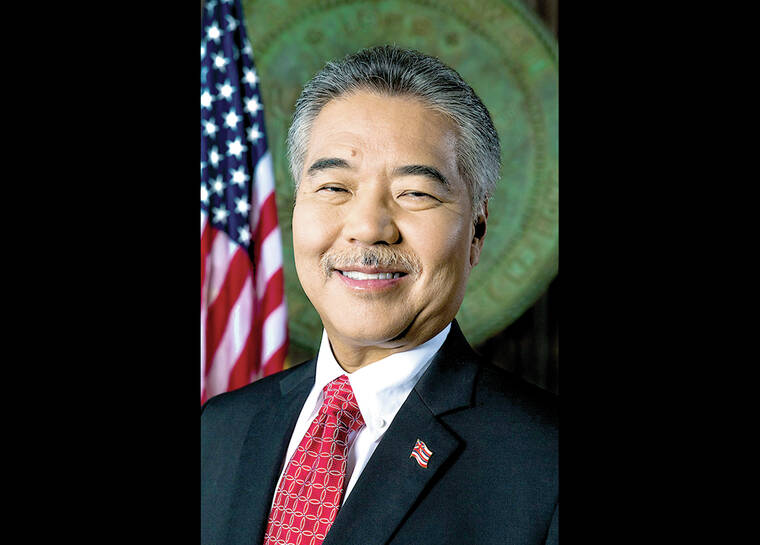Ige signs bills aimed at fighting climate change, encouraging renewable energy
Gov. David Ige on Tuesday signed four bills into law relating to renewable energy, climate change mitigation and clean transportation.
Gov. David Ige on Tuesday signed four bills into law relating to renewable energy, climate change mitigation and clean transportation.
At a bill-signing ceremony in his office at the state Capitol building, Ige said the new laws will keep Hawaii “at the forefront of important energy policy.”
ADVERTISING
“As we saw, last week’s U.S. Supreme Court decision limiting the federal government’s ability to fight climate change … truly underscores why it’s so important for states to act and lead.”
Noting Hawaii’s initiative to have 100% of the state’s energy generated from renewable sources by 2045, Ige said, “Since we did that in 2015, 10 other states have followed our lead.”
House Bill 1800 establishes a goal for the statewide greenhouse gas emissions limit to be at least 50% below 2005 levels by 2030. The new law requires the Hawaii State Energy Office to conduct a study to determine Hawaii’s pathway to de-carbonization, and to identify the challenges, opportunities and actions that will be needed to achieve those goals.
The measure also appropriates $350,000 from the energy security special fund to finance the study.
HB 1801 requires and establishes deadlines for state facilities, except smaller ones, to implement cost-effective energy efficiency measures. It directs the Hawaii State Energy Office to collect utility bill and energy usage data for state-owned buildings and to make the data publicly available.
And beginning July 1, 2023, the new law, where feasible and cost-effective, requires the design of all new state building construction to maximize energy and water efficiency, maximize energy generation potential, and use building materials that reduce the carbon footprint of the project.
Rep. Nicole Lowen, a Kona Democrat, is the primary introducer of both pieces of legislation. Big Island Reps. Greggor Ilagan, Jeanne Kapela, Mark Nakashima, David Tarnas and Chris Todd, all Democrats, are among those signing on to both measures.
“As we face an increasingly uncertain future and growing urgency to act quickly to reduce climate-changing emissions, these bills represent movement in the right direction, even as the need for bolder action still remains,” Lowen said during the ceremony.
Another bill, HB 2089, amends the definition of “renewable portfolio standard” to mean a percentage of electrical energy generation, rather than sales, excluding customer-owned portable generators powered by fossil fuels. It also expands the circumstances that are beyond an electric utility company’s reasonable control to include nonrenewable energy generated by facilities over which the electric utility doesn’t have direct control or ownership.
The bill — which was introduced by House Speaker Scott Saiki as part of Ige’s energy package — also requires electric utilities to track and annually report data and trends on customer retention and attrition to better calculate renewable portfolio standards.
“This calculation represents a more accurate picture of how much energy we produce from renewable sources and will help us to more strategically approach our goals to reduce our dependence on fossil fuels,” Ige said.
The fourth bill, SB 2570, establishes a rebate of $200,000 for the installation or upgrade of a hydrogen-fueling system and establishes a hydrogen fueling system sub-account within the Public Utilities Commission special fund.
It also reduces the allocation that the energy systems development special fund receives from the environmental response, energy and food security tax on barrels of petroleum products from 8 cents to 5 cents, and allocates the 3-cent difference to the hydrogen fueling system sub-account.
“This is especially important for medium- and heavy-duty vehicles like trucks and semi-trailers, and other emerging, innovative transportation technologies, ” Ige said.
Sen. Glenn Wakai, an Oahu Democrat, introduced the bill. Big Island Sens. Lorraine Inouye and Joy San Buenaventura, both Democrats, are among the lawmakers signing on to the measure.
“Hydrogen has the potential to de-carbonize both our electrical system, as well as our transportation system,” Wakai said. “And once produced, hydrogen also has the benefit of energy storage.”
Wakai said there are only 48 hydrogen-fueling stations for vehicles in the U.S. — 47 in California and the other one in Mapunapuna near the Daniel K. Inouye Honolulu International Airport.
“A hydrogen-fueling station can cost north of $2 million,” he said, adding the $200,000 rebates are incentives for the manufacture and installation of new hydrogen-fueling stations.
Ige called the new laws “critical efforts to transition the state away from imported fuels and towards a renewable, local and secure future.”
Email John Burnett at jburnett@hawaiitribune-herald.com.





